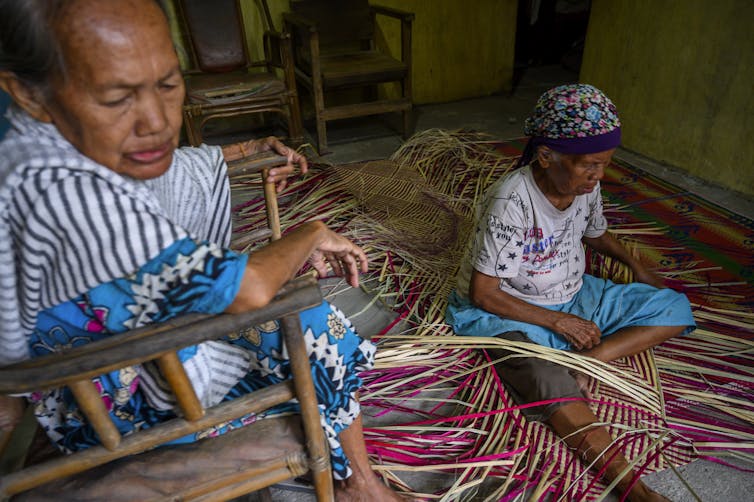The COVID-19 pandemic has affected vulnerable communities globally, and poor women are among those groups severely affected.
Indonesian women carry the burden of unpaid work, including care-giving, due to persistent gender inequality in Indonesian society and segregation in the labour market.
This burden has only multiplied during the pandemic. Limited access to health services and education has made things worse.
Our latest research shows how women, especially poor women, are suffering more due to this pandemic, putting them at profound risk of health and economic disadvantage.
Women are more vulnerable to COVID-19 transmission
Though men are more likely to die of the disease, women and men are equally exposed to COVID-19 infection. Pre-existing gender inequalities put women at a higher risk of coronavirus in part due to gender biases in vehicle ownership patterns.
In patriarchal Indonesia, women are more frequent users of public transports than men since, because many women do not own their vehicles. This exposes female workers to greater risk of infection when restrictions ease and commuting starts to return to normal.
Poor Indonesians, in general, have less access to hospitals and are more likely to visit community health centres. However, poor women are even less likely than poor men to visit a hospital (6.2% and 7%, respectively).
Our calculations, drawn from 2019 National Socio-Economic Survey, show at least 11 million households have a female head, which is equivalent to 15% of total households in Indonesia.
We found these female-headed households have poorer living conditions than their male counterparts in 2019.
These women and their families live with limited access to clean water, poor hygiene and restricted space. This makes social distancing hard or impossible, putting them at risk of COVID-19 infection.
School and economic shutdown
Economic shutdown and school closures due to COVID-19 also disproportionately affect women.
Indonesia’s informal sector dominates its economy, with around 70.5 million people working in informal work in 2019. This is more than half of Indonesia’s total workforce.
The pandemic hurt people working in informal sector most, as demand drops and businesses like restaurants and hotels cease operating due to social distancing policies.
In 2015, nearly half of Indonesia’s poor population worked in the informal sector and poor women are more likely to work in the informal sector, lower average levels of education make it hard for them to find work in the formal sector.
Poor women working in the informal sector are mostly self-employed, or are employed on insecure contracts. So poor women who work as informal workers are at risk of losing their income source during the pandemic.
The COVID-19 pandemic has also meant many women need to act as their own children’s private tutors at home.
The Indonesian government has closed down schools to prevent further infection and introduced an online learning system where students learn from home.
Nearly 2.5 million female-headed households have children at primary school age. This means these women have to juggle earning money for their families with teaching their children.
Our analysis also found more than five million female-headed households have older people to support.
More than 16.5% of these households are in the “sandwich generation”, where the main breadwinners must care for both older and younger generations.
And one in two poor female-headed households also have to provide care for people with disability in their home.
These combined burdens are likely to affect Indonesian women’s economic participation, which is already low at 53% in 2019.
What to do?
The Indonesian government set up a National Economic Recovery program with a total budget of Rp 677.2 trillion (US$42 billion), which includes a social assistance fund allocation for the poor.

To date, the policy responses have not specifically addressed the needs of marginalised groups, including women. The latest data show the number of men who received social assistance since the pandemic begin is higher than that of women.
The government’s failure to reach the right people is mostly due to a complicated disbursement policy that is not sensitive to the needs of marginalised groups. Their list of beneficiaries still relies on old data from before the pandemic struck.
Meanwhile, it’s unclear what efforts will be made to reach marginalised groups after the pandemic. Acknowledging the different needs of different population groups is essential to effectively targeting and supporting those in need.
The current fund disbursement policy isn’t straightforward for applicants, especially women with limited mobility.
Under the current system, each applicant has to provide approval letters from their local neighbourhood or village authorities, and the applications have to go to local government offices to be approved.
This long application process could discourage many from registering.
The government could explore other means of new registration for social assistance; for example through online applications, or using institutions with a good networks in remote areas, such as the state-owned postal service.
The government could also proactively reach and register those impacted most by deploying local authorities.




